The Centre’s activities started with the celebrated writer William Dalrymple’s inaugural lecture on the important topic of Syncretic Civilization of the Deccan held on 11th September 2012. The lecture has broken new ground in terms of historical scholarship and speaks about many finer nuances of Deccan’s syncretic culture. It was pictorially illustrated, translated into Urdu and brought out as a monograph in both English and Urdu. It also forms the first publication of the H.K.Sherwani Centre for Deccan Studies. |
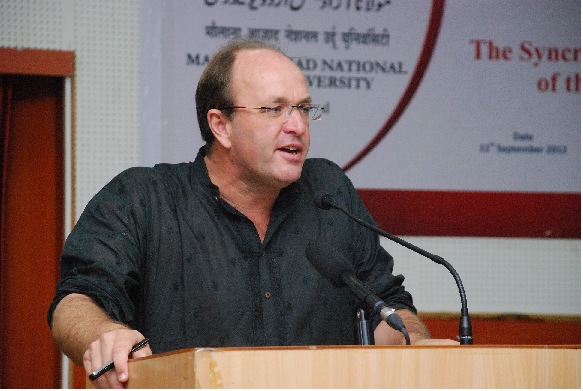 |
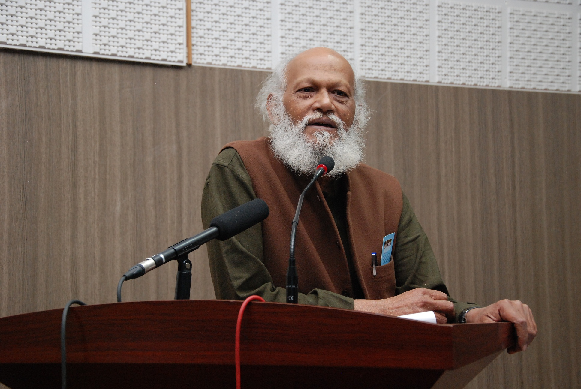 |
The second event was organised on Deccani Miniature Paintings on 27th November 2012 in which the internationally renowned artist Jatin Das gave a lecture on the said theme. According to him the Deccani Miniature Paintings carry the influence of Persian and Kalamkari arts. They are distinguished by the absence of ornate border but at the same time have brilliant colours. He firmly opined that the master pieces of this art form should be saved and restored for posterity. Dr. Salma Farooqui, Director of H.K. Sherwani Centre for Deccan Studies, presented a historical perspective of these paintings in the form of a powerpoint presentation.
|
Former Union Minister for Human Resource Development Shri. M.M. Pallam Raju laid the Foundation Stone of the H.K.Sherwani Centre for Deccan Studies building on 31st December 2012. Describing the Deccan as a ‘unique geographical location with a unique history and culture’, he said that the Centre for Deccan Studies will play an instrumental role in inter-disciplinary research of the region. He also suggested that a museum should come up at the Centre to display everything distinctively Deccan. |
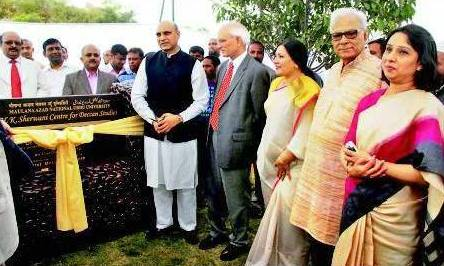 |
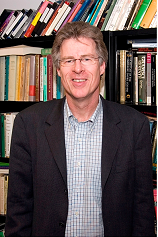 |
The Centre invited Prof. Rudi Matthee, Munroe Professor of History from the University of Delaware, USA who delivered a lecture on Historical Connections: Iran and the Deccan on 9th January 2013. |
The Centre for Deccan Studies in association with Spic Macay and the Australia-India Council also organized a talk by John Zubrzycki, a critically acclaimed writer journalist presently the world commentary editor at the Australian newspaper in Sydney on Weaving Together History and Biography of the Nizams on 1st February 2013. Mr. Zubrzycki said there was tremendous development in education, industry, economy and business in the state of Hyderabad under the Nizams which was unparalleled and stressed the importance of conserving the rich heritage of Hyderabad. |
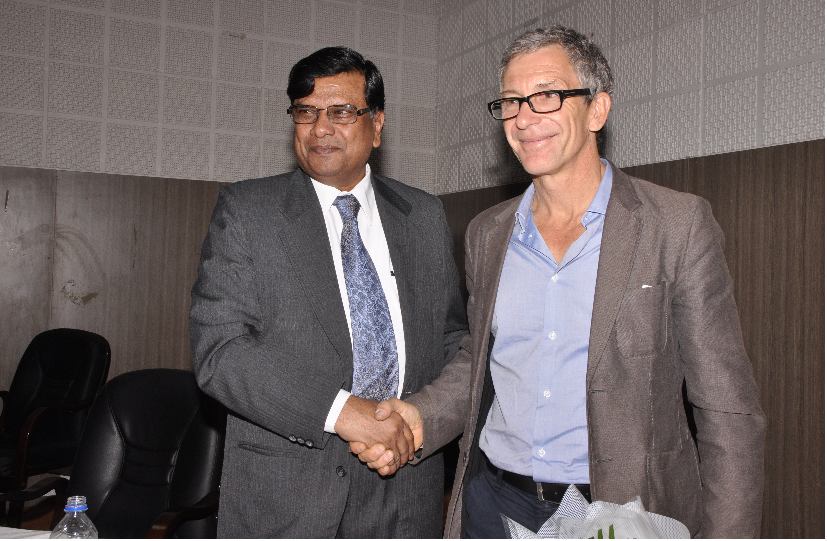 |
The Centre completed a major research study titled A Cartographic Profile of the Deccan which has put together 135 maps and nautical charts produced by map-makers, hydrographers and foreign travellers some as old as 900 years and some as young as only a 100 years in 10 different languages - Portuguese, Dutch, French, English, German, Italian, Latin, Catalan, Chinese and Arabic. Janab Najeeb Jung, Lt. Governor of Delhi released the book in English and Urdu versions on 20th September 2013 at Hyderabad. The book gains significance and has generated lot of interest since there is no historical atlas of the Deccan till date.
Keeping upto its mandate, the Centre has also organised a play Quli Dilon ka Shahzaada on formation of Hyderabad by the famous Qadir Ali Baig Foundation on 13th February 2014 at 7 p.m. at the amphitheatre of the Maulana Azad National Urdu University. The play, in Urdu language, featured the legendary love story of Mohammad Quli Qutb Shah and Bhagmati in the form of a dialogue accompanied by choreographed shadow dance, period sets and costumes, live Qawwali with nazms and Urdu/Persian verses written by Prince Quli Qutb Shah himself. The play lasted for 65 minutes and was well attended by an audience of over one thousand which included distinguished personalities from different walks of life. |
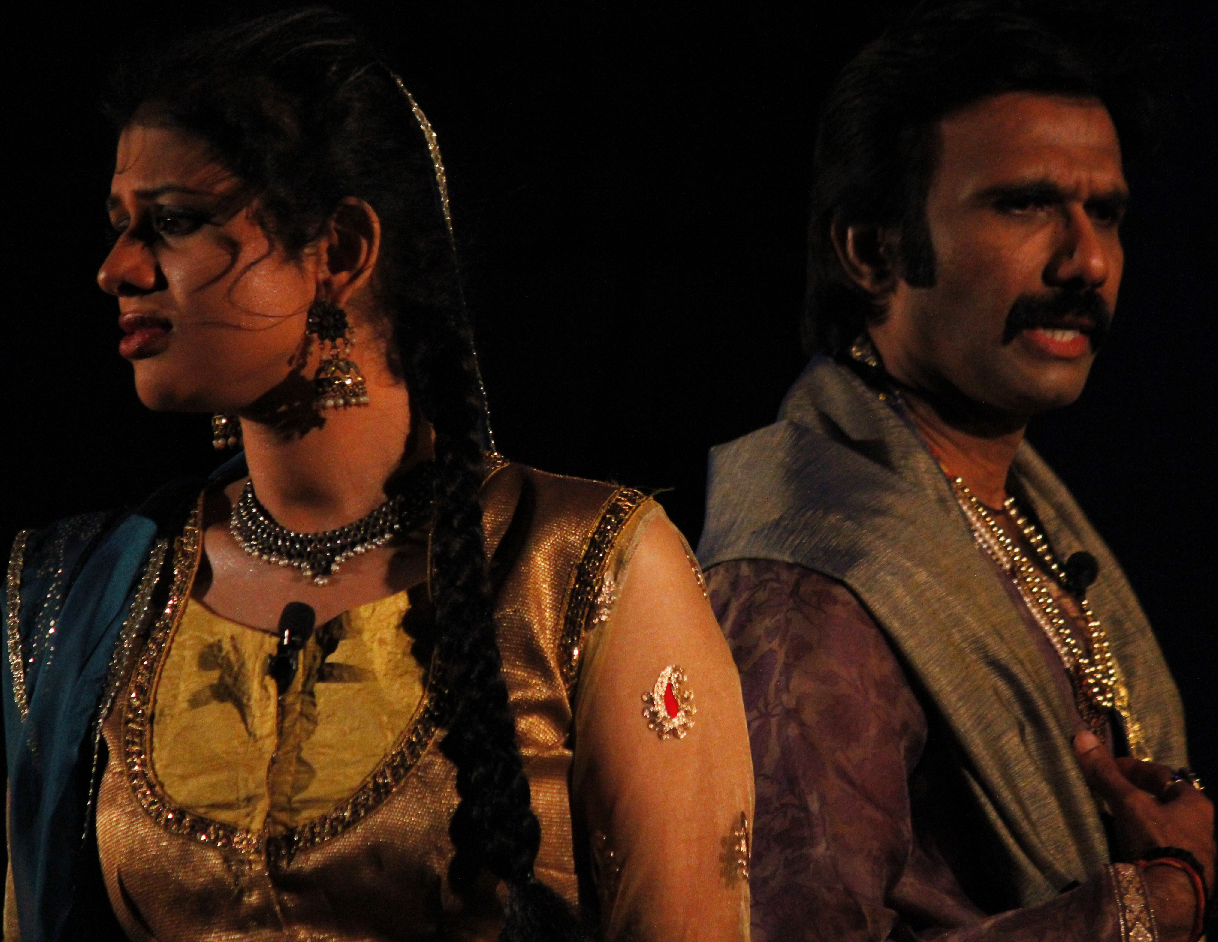 |
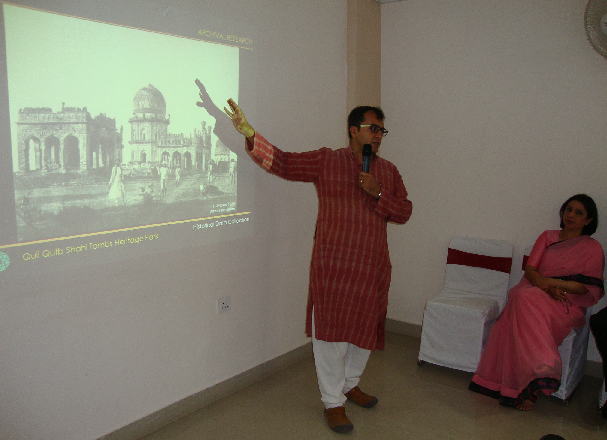 |
The Centre held an important awareness meeting on 3rd June 2014 on restoration of Qutb Shahi Tombs in which Ratish Nanda, the noted Indian conservation architect who is leading the works at the Qutb Shahi Tombs heritage complex as the Project Director of Aga Khan Trust for Culture gave a presentation of the ongoing works. The discussion forum was presided over by the former Hon’ble Vice Chancellor Prof. Mohammad Miyan. It was attended by eminent conservation architects, heritage experts, engineers, and academics, representatives from the US Consulate, administrators, bureaucrats, media persons and social activists interested in conservation and heritage management.
|
10-Day Archaeology Workshop
The H.K. Sherwani Centre for Deccan Studies in association with the Aga Khan Trust for Culture, New Delhi jointly organized a 10-day Archaeology Workshop at Qutb Shahi tombs from 24th November to 3rd December 2014 for the students of the Dept. of History, MANUU to introduce the undergraduate students to archaeological methods and train them in public archaeology and cultural resource management. During the workshop, the students were taught about archaeology and its techniques by eminent archaeologists, historians and conservationists. The workshop provided the students with detailed knowledge of the concepts, methods, and equipments of archaeology as well as management of archaeological heritage.
The students were made part of the excavations that are being carried out by Aga Khan Trust for Culture to trace the layout of the royal necropolis complex that was built in the 16th century. These excavations are aimed at unearthing the pathways, water works and gardens which were part of this complex. During the practical sessions the students were trained in locating an archaeological site, establishing survey parameters, exploring the contents of the site, evaluating the data collected and documenting the findings. The students also performed the duties as tourist guides and guided the visitors to Qutb Shahi tombs.
Mr. K.K. Muhammed, renowned archaeologist and Project Archaeological Director of Aga Khan Trust for Culture, delivered a series of lectures on various aspects of archaeology like types of archaeology, exploration, excavation and conservation of archaeological sites, human evolution, migration patterns, nature of settlements, dating methods, pottery types, artefact identification and bone analysis, etc.
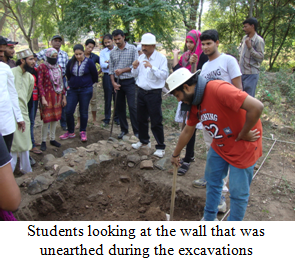 |
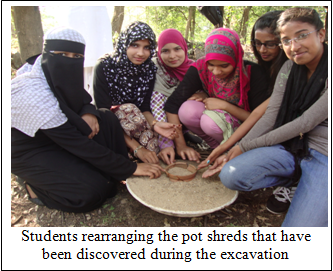 |
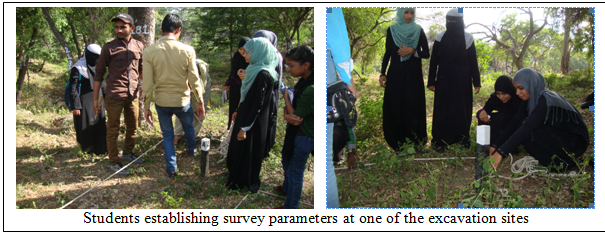 Prof. Sanjay Subodh of University of Hyderabad explained the technology of hydrology and hamams of the Qutb Shahis which is a testimony to the advanced hydrological and thermodynamic engineering skills of the builders. Prof. K.P. Rao, renowned archaeologist and professor of History at the University of Hyderabad explained the worldwide phenomenon of erecting huge stone monuments called ‘megaliths’ which is an intriguing aspect for archaeologists. He also explained the usage of technology in archaeological excavations by giving an example of how Geographic Information System (GIS) is helping in digital mapping of archaeological sites. Mr. Ch. Babji Rao, Assistant Superintending Archaeologist, Hyderabad Circle of the Archaeological Survey of India explained archaeological source material, aims of archaeological excavations, dating methods, grid patterns, etc.
Release of A Lexicon of Deccani Terms
| The H.K.Sherwani Centre for Deccan Studies, keeping up with its commitment to research and value added empiricism in academics came out with its second research work titled A Lexicon of Deccani Terms, wherein an attempt has been made to give an alphabetical listing of terms that have been used in Deccan’s domain of knowledge with their meanings. The book was released by Janab Mukhtar Abbas Naqvi, Hon’ble Minister of State for Minority Affairs, Govt. of India in the presence of Prof. Ved Prakash, Chairman, University Grants Commission and Prof. Mohammad Miyan, Hon’ble Vice Chancellor and other distinguished guests. The book has listed out around ten thousand words and terms in various languages associated with the Deccan from Urdu, English, Arabic, Persian, Turkish, Prakrit (terms related to the Satavahanas, later rulers and Kakatiyas), Sanskrit, Telugu, Tamil (terms related to the Vijayanagar period), Kannada and Marathi. |
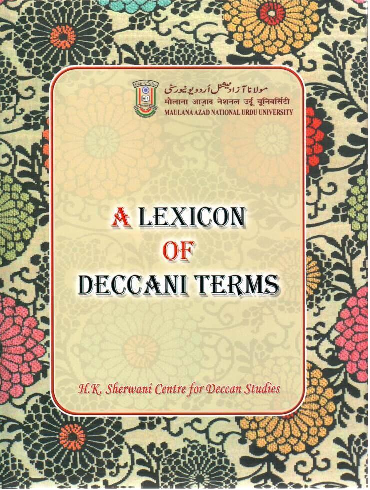 |
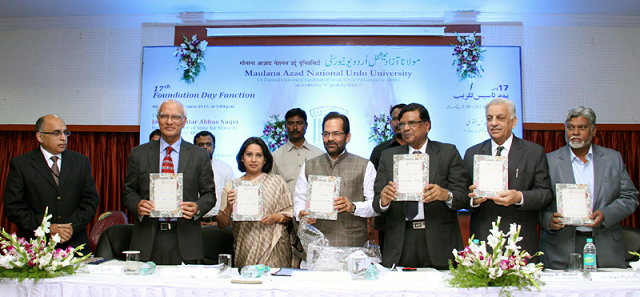
International Scholar Joins the Centre
| The H.K. Sherwani Centre for Deccan Studies entered into an international collaboration with the Association for the Study of Persianate Societies (ASPS) for a Travel cum Research Grant ASPS/MANUU VISITING SCHOLAR FELLOWSHIP in 2013. Dr. Karen Ruffle, Assistant Professor, Dept. of Religious Studies, University of Toronto, Canada was selected as the inaugural research scholar for the fellowship for 2014-15. She will be attached to the Centre for a period of six months and would be working on the project proposal Somatic Shiism: The Body in Deccani Shii Material and Ritual Practice. |
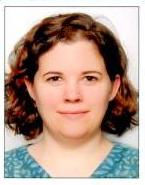 |
ICOMOS Meeting
The International Council on Monuments and Sites (ICOMOS) India, the scientific advisor to UNESCO on world heritage matters, held their Annual General Body Meeting at the Maulana Azad National Urdu University, Hyderabad on 22nd March, 2015. ICOMOS constituted a Working Group on Training to formulate an approach document for the H.K. Sherwani Centre for Deccan Studies for setting up of a Documentation Centre and Conservation Studio for heritage management at the Centre. This would include establishment of archives, library, museum and a laboratory for scientific investigation
Release of Trading Network of the Deccan
The research study titled Trading Network of the Deccan offers a fascinating narrative of Deccan’s trading practices since ancient times. Comprising of five chapters the research study focuses on the complex world of the Indian Ocean, origin of mercantile communities, movement of material commodities, emergence of ports and trading centres on the eastern and western coasts of the Deccan, trade routes and the support of the Deccani States towards trade. The research study was released by eminent jurist and writer Janab A.G. Noorani and the Hon’ble Vice Chancellor, MANUU, Dr. Mohammad Aslam Parvaiz on 21st January 2016 at MANUU campus.
Lecture by Janab A.G. Noorani
| Mr.A.G.Noorani, eminent jurist delivered a talk about a very crucial period in Indian history that changed the destiny of a State – Hyderabad – that was envied the world over. The lecture was titled Relations between Delhi and Hyderabad 1947-1948. He said while referring to the events and circumstances that prevailed between 1947 and 1948, the former Princely State of Hyderabad was a tragedy in the making from the very beginning which could have been avoided by not putting into action Operation Polo or what is popularly called Police Action. The lecture was held on 21st January 2016 at MANUU campus. |
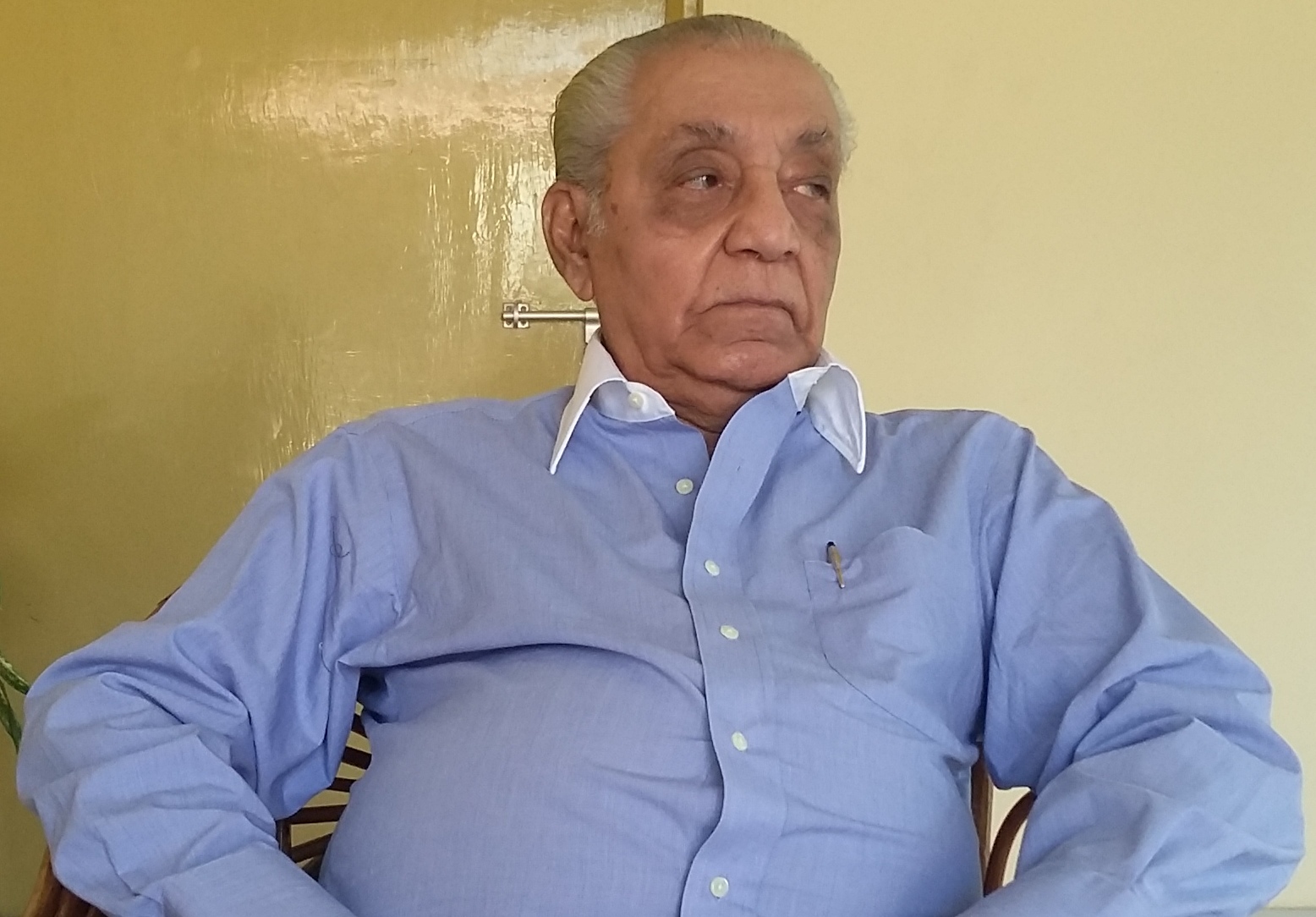 |
Lecture and Powerpoint Presentation by Dr.N.Taher, Superintending Archaeologist, Archaeological Survey of India (ASI), Hyderabad Circle
The H.K.Sherwani Centre for Deccan Studies organized a lecture by Dr. N. Taher, Superintending Archaeologist, Archaeological Survey of India (ASI), Hyderabad Circle on the theme of Personality of a Monument: A Case Study of St. Augustine Complex in Deccan’s Old Goa on 22nd September 2016. The lecture was significant for it encompassed facets of different disciplines such as archaeology, history, genetics, and chemistry reflecting the multi-disciplinary character of academics that the Centre focuses upon.
International Symposium on Networks in the Deccan on 30th-31st January 2017
The H.K.Sherwani Centre for Deccan Studies organized an international symposium on the theme Networks in the Deccan on 30th-31st January 2017. In an India whose historiography is dominated by North-Indian studies, recognition of the many cosmopolitan connections of the Deccan is reassuring to scholars and Deccani enthusiasts. It not only displays remarkable heritage of the region, but is a testimony to Deccan’s intellectual life of today.
The overarching theme ‘Networks’ was chosen carefully to encompass historical, cultural and commercial connectivity in the region. What resulted was a celebration of diversity that aims to establish enduring linkages with various faculties working on dynamic aspects of the Deccan. The convergence of scholars, both Indian and foreign, from multiplicity of backgrounds who have an intensive understanding of the Deccan – Telangana, Andhra Pradesh, Maharashtra, Karnataka and Goa threw up many new themes of research in the Deccan like the sluice system in medieval Bijapur, military techniques used in warfare, use of forts other than for defence purpose, commercial and cultural links with South East Asia, positioning of artisan communities etc.
There were talks and presentations ranging from locating Deccan in the global context emphasizing the periodic wars and the shifts in which ethnic-religious groups held power, the talks in art history, architecture, commerce, and language which show the interplay of communities and the synthesis of multiple traditions that characterizes the Deccan in between and perhaps even during the conflicts.
|